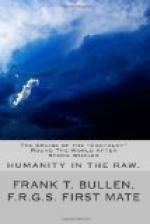It has been already noticed that they were Roman Catholics—all except Tui, who from his superior mental elevation looked down upon their beliefs with calm contempt, although really a greater heathen than any of them had ever been. It was quite pathetic to see how earnestly they endeavoured to maintain the form of worship to which they had been accustomed, though how they managed without their priest, I could not find out. Every evening they had prayers together, accompanied by many crossings and genuflexions, and wound up by the singing of a hymn in such queer Latin that it was almost unrecognizable. After much wondering I did manage to make out “O Salutaris Hostia!” and “Tantum Ergo,” but not until their queer pronunciation of consonants had become familiar. Some of the hymns were in their own tongue, only one of which I call now remember. Phonetically, it ran thus—
“Mah-lee-ah, Kollyeea leekee;
Obselloh mo mallamah.
Alofah, keea ma toh;
Fah na oh, Mah lah ee ah”—
which I understood to be a native rendering of “O Stella Maris!” It was sung to the well-known “Processional” in good time, and on that account, I suppose, fixed itself in my memory.
Whenever any of them were ordered aloft, they never failed to cross themselves before taking to the rigging, as if impressed with a sense of their chance of not returning again in safety. To me was given the congenial task of teaching them the duties required, and I am bound to admit that they were willing, biddable, and cheerful learners. Another amiable trait in their characters was especially noticeable: they always held everything in common. No matter how small the portion received by any one, it was scrupulously shared with the others who lacked, and this subdivision was often carried to ludicrous lengths.
As there was so reason to hurry south, we, took a short cruise on the Vasquez ground, more, I think, for the purpose of training our recruits than anything else. As far as the results to our profit were concerned, we might almost as well have gone straight on, for we only took one small cow-cachalot. But the time spent thus cruising was by no means wasted. Before we left finally for New Zealand, every one of those Kanakas was as much at home in the whale-boats as he would have been in a canoe. Of course they were greatly helped by their entire familiarity with the water, which took from them all that dread of being drowned which hampers the white “greenie” so sorely, besides which, the absolute confidence they had in our prowess amongst the whales freed them from any fear on that head.




